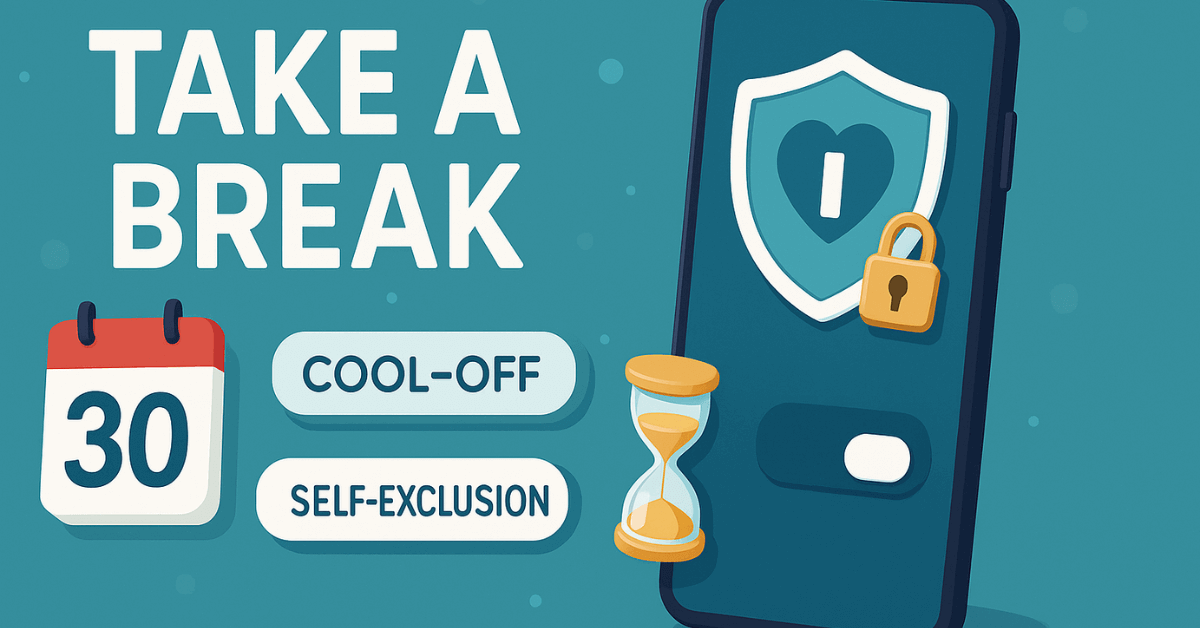
In the high-stakes, fast-paced world of online gambling, it’s easy for excitement to overshadow judgment. But for many players, recognizing when it’s time to step back is a critical part of maintaining control. Thankfully, most regulated iGaming platforms offer responsible gambling tools such as self-exclusion, cool-off periods, and time-outs to help players take a break from gambling.
This article explores these essential tools in-depth—how they work, when to use them, and what you should know to protect yourself or someone you care about.
Understanding the Need to Take a Break from Gambling
Gambling, like any stimulating activity, can become overwhelming. For some, it’s pure entertainment; for others, it develops into a habit or even addiction. Knowing when to take a break is key to preserving a healthy relationship with gambling.
Warning signs that it may be time for a break:
- Gambling more money than you intended
- Feeling anxious, irritable, or depressed when not gambling
- Chasing losses repeatedly
- Gambling is interfering with work, relationships, or health
These signs often creep in unnoticed. That’s why taking a proactive approach using built-in gambling self-exclusion tools can make all the difference.
What Is Gambling Self-Exclusion?
Self-exclusion is a formal process that allows you to voluntarily ban yourself from accessing gambling sites or facilities for a set period—or indefinitely.
🔐 How It Works:
- You choose to exclude yourself for a specific duration (e.g., 6 months, 1 year, 5 years)
- Once initiated, you cannot reverse the action until the period ends
- Your account is suspended, and marketing emails are stopped
- Many countries now have multi-operator self-exclusion registers
✅ Benefits:
- Helps stop compulsive behavior at the source
- Blocks all access, not just your account
- Gives a clear, psychological “break” from gambling
- Supports recovery by removing temptation
🔍 Popular Programs:
- GAMSTOP (UKGC): Covers all UK-licensed operators
- Spelpaus (Sweden): National exclusion system tied to your identity
- ROFUS (Denmark): Instant exclusion from all licensed gambling platforms
Cool-Off Periods: A Short-Term Reset
Cool-off or pause periods are temporary breaks you can set for hours, days, or weeks.
🧊 Ideal For:
- Players who feel they’re getting too emotional or chasing losses
- Those trying to stay on budget or reduce screen time
- Early-stage behavior management
How It Differs From Self-Exclusion:
- Cool-offs are short-term
- You can return to play after the time elapses automatically
- It’s a preventative tool—not necessarily for serious problem gambling
Platforms often offer cool-off options ranging from 24 hours to 30 days, during which access is completely restricted.
Time-Out Tools: On-Demand Limits
Time-outs are user-controlled features allowing players to take a break for a short window, usually hours to a few days.
These are especially helpful if you:
- Tend to binge gamble after a win or loss
- Want to avoid playing during certain emotional states
- Are experimenting with safer gambling habits
Some sites even allow automated daily/weekly limits on time played or money wagered.
Multi-Operator vs. Single-Operator Self-Exclusion
There’s a big difference between banning yourself from just one casino vs. many at once.
| Type | Description | Example |
| Single-Operator | Blocks one site only | Site account-only tools |
| Multi-Operator | Blocks all licensed casinos | GAMSTOP, ROFUS |
If you gamble across multiple platforms, a multi-operator program is far more effective.
Can I Still Access Help While Self-Excluded?
Absolutely. In fact, entering self-exclusion is often the first step toward seeking professional help.
🤝 Support Resources:
- GamCare – UK-based help and counseling
- BeGambleAware – Advice and support guides
- Gamblers Anonymous – Peer-support meetings worldwide
- Therapy apps – Talkspace, BetterHelp, etc.
Most reputable online casinos also provide contact information for local support groups or helplines.
How to Set Up Gambling Self-Exclusion (Step-by-Step)
Here’s how to initiate a self-exclusion:
- Log in to your casino account
- Go to the Responsible Gambling or Player Protection section
- Choose Self-Exclusion
- Select the exclusion duration
- Confirm and finalize – usually irreversible
You should receive confirmation, and your account will be frozen for the selected timeframe.
Legal & Regulatory Requirements
Top-tier gaming licenses (UKGC, MGA, etc.) require that casinos offer and enforce these tools as part of their Responsible Gambling Policies.
Operators must:
- Provide clear access to tools
- Honour all exclusions instantly
- Stop all marketing communication
- Monitor accounts for signs of problem gambling
Non-compliance may result in fines, penalties, or license revocation.
What If I Change My Mind?
In most cases, you cannot undo a self-exclusion once it’s active. This is by design. However, once the exclusion period expires:
- You may be required to complete a reactivation request
- Some jurisdictions enforce a “cooling off” period before reactivation
- Responsible sites will prompt you to consider your readiness before re-engagement
Conclusion: When in Doubt, Take a Break
Whether you’re a casual player or someone concerned about gambling habits, self-exclusion and cool-off tools exist to protect you.
These features aren’t a sign of weakness—they’re proof of strength and self-awareness.
Breaks can help you regain perspective, manage finances, and ensure gambling remains a form of entertainment, not a problem.
If you’re unsure, start small: try a time-out. If that doesn’t help, go for full self-exclusion. What matters most is taking action when you need it.
✅ Want More?
Explore more articles in our Responsible Gambling section to learn about player protection, safe gaming habits, and how operators ensure ethical play.